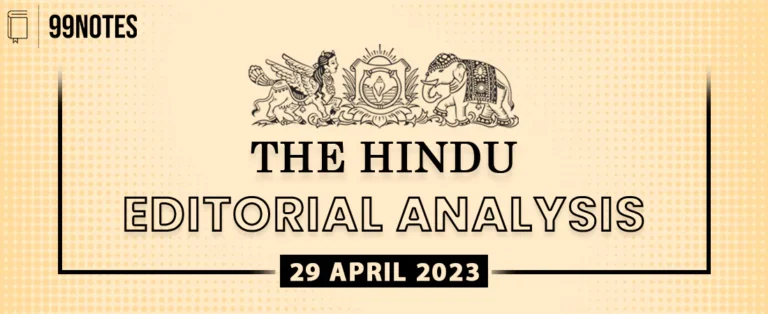11 March 2024 : The Hindu Editorial Notes PDF
The Hindu Editorial
11-March-2024
1. We need limits on election campaign spending
| Topic: GS2 – Governance – Important aspects of governance – Transparency and accountability UPSC aspirants need to understand the impact of excessive government ad spending, electoral reforms, and challenges in maintaining a fair election process. |
| Context |
| ● The article discusses concerns over excessive government ad spending before elections in India, citing past controversies and proposing electoral reforms to ensure fairness and curb unaccounted expenses. |
Introduction:
- Governments, both at the central and state levels, increasingly allocate substantial funds for pre-election advertisements, raising concerns about fairness and misuse of public money.
Ad Spend and Controversy:
- In 2004, the BJP-led government’s ‘India Shining’ campaign sparked a ₹150 crore controversy for alleged misuse of public funds.
- The Information and Broadcasting Ministry reveals the Central government spent ₹3,020 crore on ads from 2018-19 to 2022-23, with a significant spike in election year 2018-19.
Supreme Court Guidelines:
- The Supreme Court established guidelines in 2015 and 2016 to regulate government advertisements, aiming to maintain a level playing field.
- Despite these guidelines, ruling governments tend to have an advantage in advertising before elections, potentially disrupting fairness.
Election Expenditure Limits:
- Candidates face expenditure limits, with ₹95 lakh in larger states and ₹75 lakh in smaller states per Lok Sabha constituency.
- The widely breached limits suggest a norm in Indian elections, contributing to a perceived advantage for winning.
Political Parties’ Expenditure:
- No spending limits exist for political parties during elections.
- BJP and Congress officially declared ₹1,264 crore and ₹820 crore, respectively, for the 2019 elections.
- While the Centre for Media Studies estimates a total spend of around ₹50,000 crore, highlighting an opaque funding system.
Need for Electoral Reforms:
- The Indrajit Gupta Committee (1998) and the Law Commission report (1999) proposed state funding of elections to curb unaccounted expenses.
- Despite the electoral bonds scheme’s setback, the issue persists, and the CMS projects ₹1 lakh crore spending for the 2024 general elections.
Proposed Electoral Reforms:
Ad Ban and Financial Assistance Limits:
- Propose a ban on government advertisements six months before any general election to prevent undue influence.
- Amend laws to restrict a party’s financial assistance to its candidate within the prescribed election expenditure limits.
Ceiling on Party Expenditure:
- Introduce a ceiling on party expenditure, calculated as the expenditure ceiling limit for a candidate multiplied by the number of candidates the party fields.
Judicial Measures:
- Appoint additional judges in High Courts to expedite election-related cases, acting as a deterrent against norm violations.
Conclusion:
- Implementing these reforms requires bipartisan support and political will.
- Without such changes, the burden of exorbitant election expenses will continue to impact citizens, emphasizing the need for immediate attention to ensure free and fair elections.
| Issues with electoral spending in India |
● Issues:
● Way Forward:
A comprehensive approach addressing spending limits, transparency, public funding, and innovative campaigning methods can contribute to a more equitable and transparent electoral process in India. |
| PYQ: To enhance the quality of democracy in India the Election Commission of India has proposed electoral reforms in 2016. What are the suggested reforms and how far are they significant to make democracy successful? (250 words/15m) (UPSC CSE (M) GS-2 2017) |
| Practice Question: How does excessive government ad spending impact electoral fairness in India, and what reforms can ensure a level playing field? (150 Words /10 marks) |
2. Electoral bonds, the State Bank and the art of evasion
| Topic: GS2 – Governance – Important aspects of governance – Transparency and accountability UPSC aspirants must understand the article on the Supreme Court’s electoral bond judgement for insights into political funding, transparency, and governance. |
| Context |
| ● The article discusses the Supreme Court of India’s landmark decision declaring the electoral bond scheme unconstitutional, emphasising transparency, challenges in implementation, and the impact on voter rights. |
Background:
- In a historic decision on February 15, 2024, the Supreme Court of India declared the electoral bond scheme unconstitutional, criticising its role in facilitating unlimited anonymous funding to political parties.
- The scheme, which raised concerns about the influence of big money in politics, prompted the court to take decisive action.
Directive to Stop Issuance and Disclose Information:
- The Supreme Court directed the State Bank of India (SBI), the authorised issuer and encasher of electoral bonds, to cease the issuance of bonds.
- The court mandated that the SBI disclose two sets of information to the Election Commission of India (ECI) within 21 days to be published on its website.
Details of Purchased Electoral Bonds:
- The first set of information required details of electoral bonds purchased since April 12, 2019, including the date of purchase, purchaser’s name, and bond denomination.
Details of Redeemed Electoral Bonds:
- The second set pertained to details of electoral bonds redeemed by political parties within the same timeframe, encompassing the date of encashment and bond denomination.
SBI’s Affidavit and Request for Extension:
- Two days before the court’s deadline, the SBI filed an affidavit expressing its inability to comply within the prescribed time.
- The bank claimed the need for an additional four months, citing the complexity of decoding, comparing, and disclosing data due to the separation of donor information into distinct silos and the absence of a central database.
Absurdity of SBI’s Request:
- The affidavit revealed that since April 2019, 22,217 electoral bonds were used for political donations, with donor details stored in sealed covers at SBI branches.
- The SBI claimed that matching purchaser and redeemer information for these bonds, both physically and digitally stored, would be a laborious task, justifying the extended timeline.
Public Suspicion and Allegations:
- Public suspicion arose regarding the SBI’s motives, with concerns that the bank aimed to avoid revealing donor identities before the 2024 general election.
- The delay in compliance raised questions about transparency and accountability in the electoral process.
Supreme Court’s Emphasis on Voter’s Right to Know:
- The court, in its judgement, highlighted the voter’s right to information, especially regarding financial contributions to political parties and their potential impact on electoral politics and government decisions.
- Recognizing the influence of corporate funding, the court stressed that voters should have access to information about the sources of political party funding to assess any correlation between policy decisions and financial contributions.
Call for Supreme Court’s Intervention:
- Emphasising the voter’s constitutional right to know under Article 19(1)(a), the Supreme Court is urged to uphold the judgement’s timelines for disclosing electoral bond details.
- The court’s role is crucial in ensuring transparency, preventing delays, and providing voters with essential information for an informed decision in the upcoming general election.
Conclusion:
- The Supreme Court’s landmark judgment on the electoral bond scheme underscores the importance of transparency in political funding, demanding adherence to timelines and safeguarding the voter’s right to know.
- The SBI’s request for an extension raises concerns about the integrity of the electoral process, requiring vigilant oversight by the judiciary to preserve the democratic principles of accountability and transparency.
| Issues with electoral Bond scheme |
|
| Practice Question: Discuss the significance of the Supreme Court’s decision declaring the electoral bond scheme unconstitutional for enhancing transparency in political funding. (150 Words /10 marks) |
For Enquiry

11 March 2024 : The Hindu Editorial Notes PDF

11 March 2024 : PIB Summary for UPSC

11 March 2024 : Indian Express Editorial Analysis

9 Mar 2024 : Daily Current Affairs Quiz

9 Mar 2024 : Daily Answer Writing

9 March 2024 : Daily Current Affairs

9 March 2024 : Indian Express Editorial Analysis

9 March 2024 : The Hindu Editorial Notes PDF

9 March 2024 : PIB Summary for UPSC

8 Mar 2024 : Daily Current Affairs Quiz
March – The Hindu Editorial 11 March 2024 : The Hindu Editorial Notes PDF The Hindu Editorial
11-March-2024
1. We need limits on election campaign spending
Topic: GS2 –…
March 2024 PIB 11 March 2024 : PIB Summary for UPSC PIB Summary for UPSC
11-March -2024
1. India- Trade and Economic Partnership Agreement
Topic: GS3…
Indian Express 11 March 2024 : Indian Express Editorial Analysis Indian Express Editorial Analysis
11-March-2024
1. A dialogue among healers
Topic: GS2 – Governance…
Daily Quiz 9 Mar 2024 : Daily Current Affairs Quiz 9 Mar 2024 : Daily Quiz…
mains answer writing 9 Mar 2024 : Daily Answer Writing Mains Answer Writing
9-March-2024
Q1) Balancing the depth and range of the RTI Act is crucial for ensuring…
Daily Current Affairs 9 March 2024 : Daily Current Affairs Daily Current Affairs
9-March -2024- Top News of the Day
1. ECI’s Proposal to Remove Aadhaar Linkage…
Indian Express 9 March 2024 : Indian Express Editorial Analysis Indian Express Editorial Analysis
9-March-2024
1. Change in the Valley
Topic: GS2 – Governance –…
March – The Hindu Editorial 9 March 2024 : The Hindu Editorial Notes PDF The Hindu Editorial
9-March-2024
1. India’s suboptimal use of its labour power
Topic: GS3 – Indian…
March 2024 PIB 9 March 2024 : PIB Summary for UPSC PIB Summary for UPSC
9-March -2024
1. India receives ‘Measles and Rubella Champion’ Award for Exemplary…
Daily Quiz 8 Mar 2024 : Daily Current Affairs Quiz 8 Mar 2024 : Daily Quiz…




